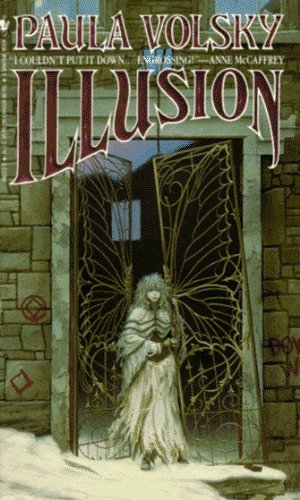Paula Volsky, Illusion
reviewed by Alison McBain

Illusion Publisher: Bantam Books Date: January 17, 1993 Length: 674 pages ISBN: 0553560220 |
I’ve long been fascinated by the French Revolution, and I’m not the only history buff who finds that time period and location near the top of their reading list. If I discover a novel based on it, I’m the first in line to pick it up. But no one, in my humble opinion, has been able to write a better genre retelling of a fantastical French Revolution — although it’s set on an alternate world where the country is not France but very closely based on it — than Paula Volsky in her book Illusion.
Before I get into what makes it such a strong story, here’s a bit of background on the plot. Eliste vo Derrivalle, privileged daughter of the Exalted class in the country of Vonahr, is about to be sent to the capital to be a handmaiden to the queen. Although she tries very hard to remain distant from the serfs who run her parents’ country estate, she has grown up with them and is sympathetic to their lives.
One, in particular, Dref Zeenoson, is a brilliant young man she’s followed around with hero-worship since she was a babe. When Dref gets in severe trouble with her strict father, Eliste helps Dref escape punishment and flee from her parents’ estate with the help of her Uncle Quinz. Her uncle is a master at creating illusions and communicating with Inanimates, which are mechanical creations powered by magic.
Soon, the unpleasant incident is behind her, and Eliste has completed her journey to the capital city of Sherreen. She takes up her post serving as handmaiden to the flighty queen, along with a gaggle of other Exalted young ladies who soon become her fast friends.
She gets caught up in court intrigues, celebrations all night, and the attention of court admirers. Before too long, Eliste realizes that none of her admirers compare to her affection for Dref, and none of the city Exalted are even half as talented at magic as her Uncle Quinz.
While captivated by the high life, Eliste fails to notice more and more frequent rumblings from the lower classes. When violence breaks out in different parts of the city, she thinks it’s only temporary and goes about her life as normal. But then her world is turned upside down: the peasantry revolt, the lower classes rise up, and the Exalted are cast down. The magic that is supposed to protect the status of the Exalted class — indeed, the reason why they’re considered nobility in the first place — doesn’t save them.
Instead, hostile magic wielded by the peasantry awakens the Stupefactions, huge, mechanical creatures that have been dormant for centuries. With the help of these sentient Stupefactions, the new ruling class holds sway over the city with an iron fist, making attempts to escape Sherreen nearly impossible for the Exalted who have gone into hiding.
Eliste becomes trapped, homeless and friendless, while her peers are executed in multitudes. Her only hope for survival is to adapt to this strange new world before the peasant militia uncovers her disguise and reveals her for who she really is.
If she could only escape, she could flee to her home estate and her Uncle Quinz, who she knows will protect her. But escaping the eye of the Stupefactions without any help will prove beyond her talents. It’s not until she runs into an old friend that she begins to feel hope again for the future.
While this book is set in a fantasy world based on historical France, it has much more to offer than a dry historical text. The level of detail is amazing, the events create a close parallel to real-life happenings, and the texture of the story is composed of both adventure and romance. It takes a lot for Eliste to grow up and become the woman she would have been, if not for the rigid rules of society and privilege that have spoiled her better nature.
Told in a personable style, it’s easy for the reader to sympathize with Eliste’s turmoils, even when, at the beginning of the book, they are frivolous. Glimpses of the person she is to become shine through, even when she is trying her hardest to fit in with others of her class. But in the midst of a life and death struggle, she soon discovers that what she’s been raised to believe about nobility, humanity and herself has become contradictory to the reality of life.
I’ve read the book a dozen times, and each time, I’m still on the edge of my seat as Eliste faces the challenges she must overcome at each step of her journey. If looking to label this book’s genre, I’d probably want to come up with a new term for it, since it’s too late for “clockpunk” and too early for “steampunk,” although it has many components of the punk genre. Perhaps “revolutionpunk”?
Regardless of its classification, this is one of my all-time favorite books, and I hope you enjoy reading it as much as I did and still do, each time I reread it. I highly recommend it.
Copyright © 2018 by Alison McBain

